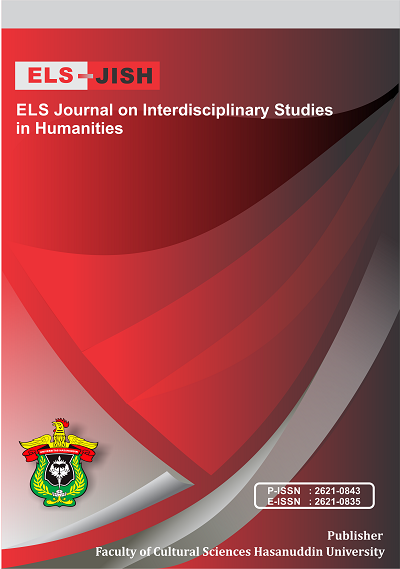Pragmatism in Police Stations: An Evaluation of the Violation of Grice’s Maxims in Suspects' Interrogations
DOI:
https://doi.org/10.34050/els-jish.v7i4.42104Keywords:
Grice’s maxims, Interrogation, Police station, Pragmatics, SuspectsAbstract
During police interrogations, accused persons flout or violate conversational maxims to seek a soft landing or escape the law's wrath. Hence, this study evaluates the frequency at which Grice's Maxims were violated during suspects' interrogations. The study identifies these violations based on four maxims: quality, quantity, manner, and relation/relevance results of this study indicate that accused individuals often violate the maxim of quantity to create distractions and divert attention from incriminating evidence during police investigations. The results also show that accused persons violate the maxim of manner by making obscured statements to reduce tension during interrogations. This paper concludes that in suspects' interrogations, accused persons use flouting or violation of Grice's Maxims as communicative tools to escape the punishment(s) apportioned for crime(s) that they commit directly or indirectly.
References
Aboh, R., & Uduk, H. (2017). Meaning in Discourse: An Introduction to Discourse Analysis. Ibadan: Kraft Books Limited.
Ajayi, T. M. (2014). Interrogation, questioning or interview?: Police-suspects interactions in Nigeria. Journal of the Linguistic Association of Nigeria, 17(1&2), 43–61.
Ajayi, T. M., & Oyetunde, S. O. (2016). Impoliteness in police-suspect interaction in Ibadan. Journal of West African Languages, 45(2), 41–60.
Amelia J, Y., Bin, W.W, & Rahman, F. (2024). Vocabulary Mastering of Hanyu Shuiping Kaoshi Level 3 Students of Chinese Language and Culture Study Program Hasanuddin University. ELS Journal on Interdisciplinary Studies in Humanities, 7(3), 410-417. https://doi.org/10.34050/elsjish.v7i3.37181
Anumudu, K. U., & Abaya, A. S. (2019). A critical discourse analysis of the language of dominance in selected police interrogation of suspects in Kaduna metropolis.
Awaru, T., Rahman, F. & Bin, W.W. (2024). Phonological Errors Analysis in Mandarin Pronunciation by Students of the Mandarin Language Program at Hasanuddin University. International Journal of Religion, 5(11), 2721–2730
Budiarsa, M. (2015). Language dialect and register in sociolinguistic perspective. RETORIKA: Journal Ilmu Bahasa, 1, 379–387.
Dalyan, M., Darwis, M., Rahman, F., & Latjuba, A. Y. (2022). Cultural discourse in Indonesian humor: A case study of some short dialogues. Theory and Practice in Language Studies, 12(5), 1009-1018.
Ellah, S. M. (2016). Co-operation in the language of selected medical reports in Nigeria. Journal of the Annual International Conference on African Literature and the English Language (ICALEL), 7, 63–83.
Farinde, R. O., Olajuyigbe, O. A., & Adegbite, M. (2015). Discourse control strategies in police-suspect interrogation in Nigeria. International Journal of English Linguistics, 5(1).
Fetzer, A. (2004). Pragmatics as a linguistic concept. The Handbook of Pragmatics (pp. 3–27). In Lawrence R. Horn & Gregory Ward (Eds.). Oxford: Blackwell.
Grice, H. P. (1968). Logic and conversation. In P. Cole & J. L. Morgan (Eds.), Syntax and Semantics (Vol. 3, pp. 41–58). New York: Academic Press.
Haugh, M. (2002). The intuitive basis of implicature: Relevance theory of implicitness versus Gricean implying. International Pragmatics Association, 12, 117–134.
Horn, R. L., & Ward, G. (2004). The Handbook of Pragmatics. Oxford: Blackwell.
Huang, Y. (2007). Pragmatics. Oxford: Oxford University Press.
Hymes, D. (1972). Models of the interaction of language and societal life. Directions in Sociolinguistics: The Ethnography of Communication (pp. 35–71). New York: Holt, Rinehart & Winston.
Jarmila, P., & Jirka, H. (2011). Introduction to Linguistics: Pragmatics. Palgrave Macmillan.
Junaid, S., Andini, C., Satria, S., Alwi, W., & Amalia, A. N. (2024). The Analysis of Culture Shock Experienced by Erin Gruwell in Freedom Writers (2007) Movie. Journal of Islamic Culture and Literature (JICel), 3(2).
Kabir, S. M. (2016). Method of data collection: Basic guides for research. Available at ResearchGate.
Kassin, S. M., Leo, R. A., Meissner, C. A., Richman, K. D., Colwell, L. H., Leach, A., & Lafon, D. (2007). Police interview and interrogation: A self-report survey of police practices and beliefs. Law and Human Behaviour, 31(5), 381–400.
Markov, I., Kharitonova, K., & Grigorenko, E. (2023). Language: Its origin and ongoing evolution. Journal of Intelligence, 11(61). Available at https://doi.org/10.3390/jintelligence11040061.
Mey, J. (2001). Pragmatics: An Introduction (2nd ed.). Oxford: Blackwell.
Morris, C. (1971). Writing on general theory of signs. The Hague: Mouton.
Ogolekwu, O. (2021). Language and religion: An evaluation of grammatical cohesion in selected Pentecostal sermons in Nigeria. In A Festschrift for Professor Eno Grace Nta. Lagos: University of Lagos Press.
Osisanwo, W. (2008). Introduction to Discourse and Pragmatics. Ibadan: Alafas Nigeria.
Pertiwi, L.M.A., Rahman, F., & Hasyim, M. (2024). Types of Defamation Speech Acts on YouTube: A Forensic Linguistics Study. Internastional Journal of Religion, 5(10), 4039 – 4047.
Recanati, F. (2004). The Handbook of Pragmatics. In Laurence R. Horn & Gregory Ward (Eds.). Oxford: Blackwell.
Temidayo, A. (2017). Deception in police-suspect interaction in Ibadan, Nigeria. Africology: The Journal of Pan-African Studies, 10(17).
Udoh, V. C. (2010). Linguistic features of the language of the Nigeria police. Unpublished M.A. Thesis. University of Nigeria, Nsukka.
Wilson, D., & Sperber, D. (1998). Pragmatics and time. Language and Cognition, 112.
Yaumi, M. T. A. H., Rahman, F., & Sahib, H. (2024). Bridging Language and Technology through Semiotic Technology. International Journal of Social Science Research and Review, 7(1), 52-61.
Yopi, T., Ahmad, Y., & Firqo, A. (2018). The role of maxims in the process of investigations: A case study in Situbondo Resort Police Office. Jurnal Arbitrer, 5(1). Available at ResearchGate.
Yule, G. (1996). Pragmatics. Oxford: Oxford University Press.
Downloads
Published
How to Cite
Issue
Section
License
Copyright (c) 2024 Ruth Anjorin-Ojewole, Olubunmi Idowu

This work is licensed under a Creative Commons Attribution-ShareAlike 4.0 International License.






